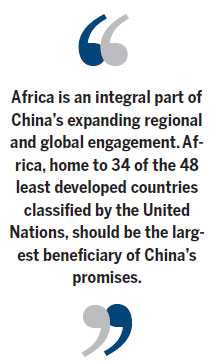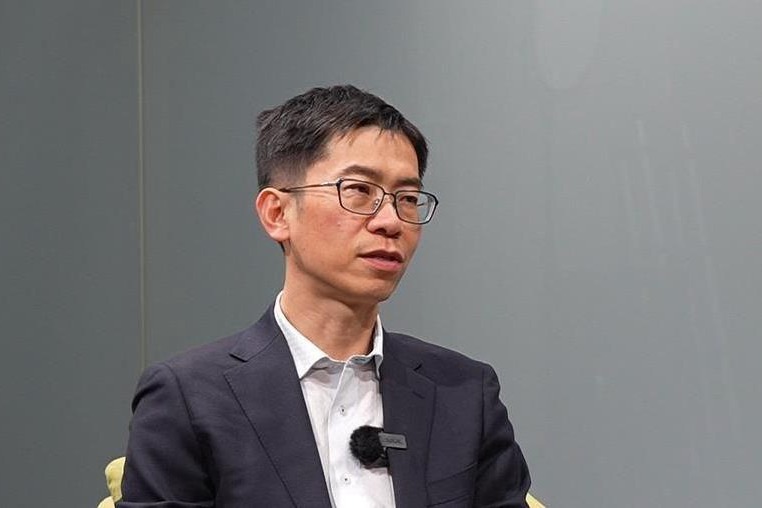Forum's strength is wide range of issues

Having lived in Africa for four years, I have come across various Chinese people and businesses in the continent, from large enterprises to the owners of small shops in the middle of nowhere working hard to make ends meet.
The scale and scope of China's engagement with Africa has risen sharply in recent years, organically and also supported by initiatives such as the Forum on China-Africa Cooperation. Established in 2000 after an initial request from Madagascar, and meeting every three years, FOCAC has been the largest common platform promoting China-Africa relations.
China was not the first country to build a partnership with African countries. France did, back in 1973, followed by Japan in 1993, and the heads of state attending such gatherings.
But what makes FOCAC special is that it covers a wider range of areas - well beyond aid - from trade and investment to cultural exchanges; from agriculture and natural resources to environmental protection; and from public health to peace and security.
Another aspect is that it served as a vehicle for increased commitments to the continent. China doubled its commitment to Africa from $5 billion at the 2006 FOCAC to $10 billion in 2009 and then $20 billion in 2012.
Under the African Human Resources Development Fund established at the first FOCAC, China has committed to training opportunities for African personnel in various fields, from 10,000 in 2003 to 30,000 in 2012.

After the 2006 FOCAC summit, China set up the China-Africa Development Fund that is now financing infrastructure development and energy and agricultural projects worth more than $3 billion. The gradual establishment of six special economic zones in Zambia, Nigeria, Ethiopia, Mauritius and Egypt has meant jobs and business opportunities.
In Johannesburg, President Xi Jinping confirmed this trend with the announcement of commitments totaling $60 billion, including $10 billion specifically for industrialization. And rightly so. Situated at the west end of shipping routes that are part of China's Belt and Road Initiative, Africa is an integral part of China's expanding regional and global engagement. Africa, home to 34 of the 48 least developed countries classified by the United Nations, should be the largest beneficiary of China's promises.
Yet a forum like FOCAC does not come without challenges. While there is an excellent bilingual website on FOCAC, there is little information on the ground on whom by, whom for and exactly how the commitments are being fulfilled, or on the lessons learned from their successes and failures.
In Beijing, more can be done to coordinate among ambassadors of African countries. More also is being done to link FOCAC to other entities such as businesses, civil society organizations and financiers. At the forum this year, many nongovernmental organizations and think tanks held helpful side events to discuss and advocate on key issues of importance to the poorest and most vulnerable people.
In addition, Africa as a whole, through its very forward-looking Agenda 2063 plan, has identified two other regional priorities beyond industrialization: infrastructure development and regional integration. These were clearly present on the FOCAC agenda, given China's increasing role as an infrastructure financier. Yet, there remains work to do to increase the voice of African countries in shaping this architecture. Only two African countries are members of the Asian Infrastructure Investment Bank, while there are 17 European members.
There also are new areas for cooperation. Xi has recently made important commitments to other developing countries in the implementation of the UN's Sustainable Development Goals. Over the past 15 years, FOCAC has increasingly emphasized poverty reduction, climate changes and people-to-people exchanges, and these were framed during FOCAC as strong entry points for supporting the goals in Africa.
Addressing these old and new challenges will not only require strong political will and openness from China, but also strong participation from Africa. I was pleased to see in statements by South African President Jacob Zuma a new commitment to monitoring and evaluation, and plans for a review of 15 years of FOCAC, which will help in communication and consideration of future priorities.
International organizations such as the United Nations Development Programme can support these endeavors, being in every African country, and engaging in South-South cooperation in China. Strengthening these kinds of linkages and mobilizing our network could further ensure that FOCAC continues to play an important part in defining the future China-Africa relationship based on Africa's development priorities.
The author is country director of the United Nations Development Programme in China.
(China Daily European Weekly 12/11/2015 page8)
Today's Top News
- Japan tempting fate if it interferes in the situation of Taiwan Strait
- Stable trade ties benefit China, US
- Experts advocate increasing scope of BRI to include soft power sectors
- New engine powers cargo drone expansion
- China to boost green industry cooperation
- Manufacturing PMI rises in November






























